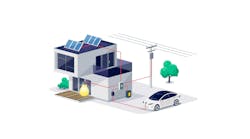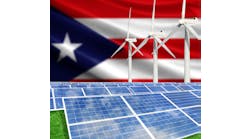Solar, wind and advanced energy advocates want the Trump administration to know that renewable energy presents no threat to electric reliability; nor is it killing the coal industry.
Three national energy associations — Advanced Energy Economy, the American Wind Energy Association, and the Solar Energy Industries Association – made their case in a letter last week to Secretary of Energy Rick Perry.
The associations were responding to Perry’s call for the Department of Energy to look into any threat to electric reliability from loss of baseload power, particularly coal-fired plants. Perry asked his staff to produce a report within 60 days.
Renewables are “homegrown energy resources” that actually help support grid reliability, the associations said. “These energy resources have already been integrated smoothly into the electric power system in large and increasing amounts, as demonstrated in countless studies and, more importantly, in real-world experience across the U.S., including in Texas.”
(Editor’s note: Microgrids and nanogrids, often built specifically because they bolster electric reliability, increasingly use solar and energy storage.)
In a memo calling for the study, Perry raised questions about how baseload power is compensated and the impact on grid resilience. Taking aim at Obama-era green energy policies, he described “regulatory burdens introduced by previous administrations that were designed to decrease coal-fired power generation.”
However, numerous studies indicate coal and nuclear plant retirements are the result of low natural gas prices and a decrease in energy demand, the energy associations said. (The U.S. is using less electricity as a result of energy efficiency measures and structural shifts in the economy toward more service sector businesses, which typically use less energy than heavy manufacturing.)
The groups also called on the DOE to “initiate a public process” to gather input for the DOE study. Specifically, they want the DOE to “follow standard practice” and conduct the study in an “open and transparent manner,” seeking public input before finalizing the report.
“Public input, including from energy market participants, grid operators, and regulators, would help ensure that any resulting recommendations from the study are based on the best available information,” the energy groups wrote.
The DOE study is due 60 days from April 19.
Tell us what you see as the major threat to electric reliability on the grid today. Post your thoughts below or on our LinkedIn Group, Microgrid Knowledge.






